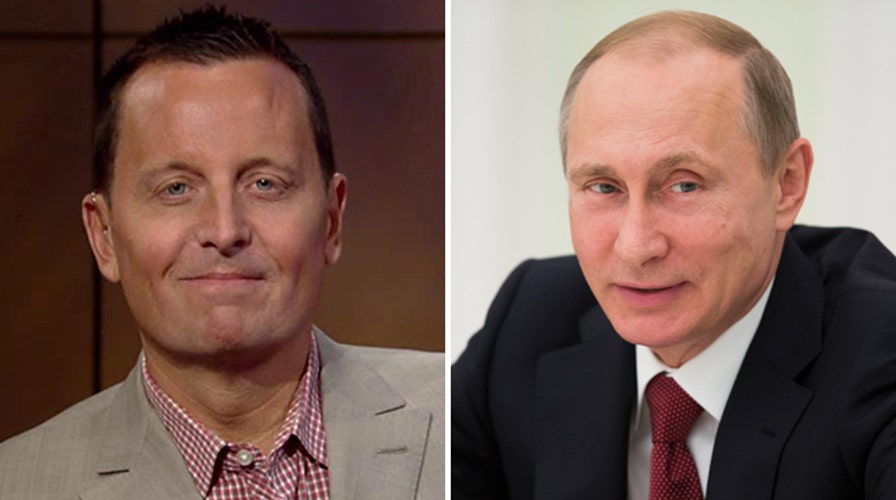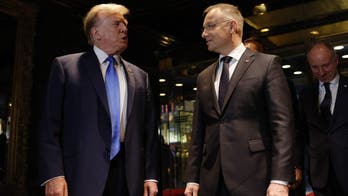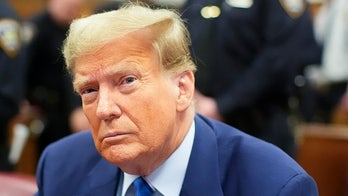Grenell: Putin sees that Obama's words 'mean nothing'
Russia denies that its military is involved in Ukraine
The White House is reportedly considering new ways to discourage Russia from meddling in Europe, in what some officials are saying is an updated version to Cold War-era containment.
The Wall Street Journal reports the approach involves beefing up militaries of allies and potential partners and weeding out corrupt governments, which Russia could potentially exploit to gain more influence.
Administration officials also want to expand NATO’s reach to limit Moscow’s orbit. Although including Ukraine or Georgia in the organization remains off the table, the Pentagon would be open to consider the small Balkan country of Montenegro to solidify its ties with the West and to show that Russia does not have veto power over alliance expansion.
The latest policy talks comes as President Barack Obama meets with world powers in Germany, where he is expected to push the topic of more Russian sanctions as the tension in Ukraine escalates even further.
U.S. officials have acknowledged that the latest sanctions have not made President Vladimir Putin change his ways, and they have voiced concerns about escalating violence in Ukraine and the use of heavy artillery that was supposed to be restricted by the cease-fire deal.
“It’s clear the sanctions are working on the Russian economy, but what is not apparent is that that effect on his economy is deterring Putin from following the course that was evidenced in Crimea last year,” said Defense Secretary Ash Carter, noting that Russian aggression would be “an enduring challenge.”
Officials say the long-term measures being discussed stem from Moscow not backing down after its territorial grab in Ukraine last year. The measures would include increasing training for European allies to resist Russia’s training of surrogate forces and conducting surprise border exercises.
The Pentagon is also drafting plans for where to position different stocks of military equipment for use in a crisis or for an advance in training exercises, the newspaper reports. That would entail an increase presence of U.S. troops in the region. However, Washington is still opposed to rebuild troop formations in Europe.
U.S. officials have acknowledged that there are different views between Europe and NATO on how to approach Russia’s aggression. Gen. Martin Dempsey told The Wall Street Journal in an interview that Russia has a whole host of capabilities to threaten its neighbors.
Dempsey said the U.S. must work with its European allies to fend off Russia’s pressure.
Others within the Obama administration do not necessarily agree how powerful Russia is.
The Journal, citing current and former officials, reports Obama is more skeptical that Moscow represents a long-term challenge and is wary of making Putin a bigger enemy than it has to be.
Secretary of State John Kerry said after a meeting with Putin last month that the two sides will work on issues of common interest.
Officials within the Pentagon reportedly have begun using harsher military terms such as deterrence instead of reassurance, the newspaper reports.
Some officials believe the U.S. must counter Russian moves in Europe. Others believe the U.S. should weaken Russia’s ability to use economic leverage to gain influence in eastern and southern Euroep.
If the U.S. can strengthen democratic institutions, professionalize militaries and curb corruption in countries, The Kremlin will have fewer ways to extend its influence, officials say.
The latest U.S. approach to expanding the NATO alliance can demonstrate the U.S. has more allies and Moscow has few friends than it believes. Such approach puts Montenegro in the spotlight of such debate.
Montenegro defense minister Milica Pejanovic-Djurisic said in an interview in her country that it is ready to join NATO.
“In the face of all the instability that is appearing in the East of Europe, strengthening security in the Balkans is part of the solution for the overall situation we are all in right now,” she said.
Overall, the U.S. main goal is to help restore post-Cold War security in Europe.





